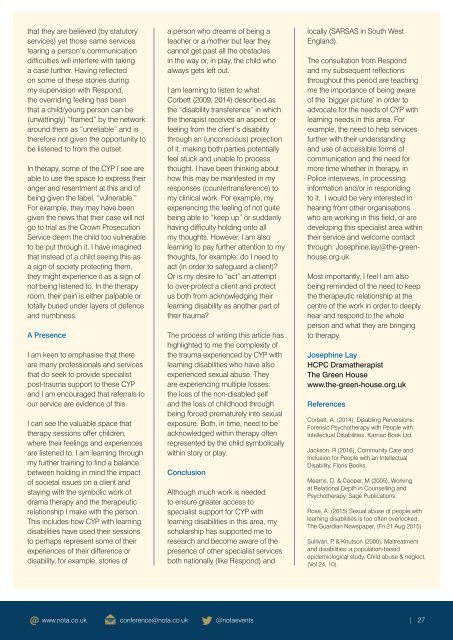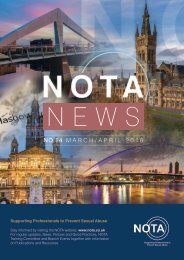NOTA News Newsletter July 2018 1
Create successful ePaper yourself
Turn your PDF publications into a flip-book with our unique Google optimized e-Paper software.
that they are believed (by statutory<br />
services) yet those same services<br />
fearing a person’s communication<br />
difficulties will interfere with taking<br />
a case further. Having reflected<br />
on some of these stories during<br />
my supervision with Respond,<br />
the overriding feeling has been<br />
that a child/young person can be<br />
(unwittingly) “framed” by the network<br />
around them as “unreliable” and is<br />
therefore not given the opportunity to<br />
be listened to from the outset.<br />
In therapy, some of the CYP I see are<br />
able to use the space to express their<br />
anger and resentment at this and of<br />
being given the label, “vulnerable.”<br />
For example, they may have been<br />
given the news that their case will not<br />
go to trial as the Crown Prosecution<br />
Service deem the child too vulnerable<br />
to be put through it. I have imagined<br />
that instead of a child seeing this as<br />
a sign of society protecting them,<br />
they might experience it as a sign of<br />
not being listened to. In the therapy<br />
room, their pain is either palpable or<br />
totally buried under layers of defence<br />
and numbness.<br />
A Presence<br />
I am keen to emphasise that there<br />
are many professionals and services<br />
that do seek to provide specialist<br />
post-trauma support to these CYP<br />
and I am encouraged that referrals to<br />
our service are evidence of this.<br />
I can see the valuable space that<br />
therapy sessions offer children,<br />
where their feelings and experiences<br />
are listened to. I am learning through<br />
my further training to find a balance<br />
between holding in mind the impact<br />
of societal issues on a client and<br />
staying with the symbolic work of<br />
drama therapy and the therapeutic<br />
relationship I make with the person.<br />
This includes how CYP with learning<br />
disabilities have used their sessions<br />
to perhaps represent some of their<br />
experiences of their difference or<br />
disability, for example, stories of<br />
a person who dreams of being a<br />
teacher or a mother but fear they<br />
cannot get past all the obstacles<br />
in the way or, in play, the child who<br />
always gets left out.<br />
I am learning to listen to what<br />
Corbett (2009, 2014) described as<br />
the “disability transference” in which<br />
the therapist receives an aspect or<br />
feeling from the client’s disability<br />
through an (unconscious) projection<br />
of it, making both parties potentially<br />
feel stuck and unable to process<br />
thought. I have been thinking about<br />
how this may be manifested in my<br />
responses (countertransference) to<br />
my clinical work. For example, my<br />
experiencing the feeling of not quite<br />
being able to “keep up” or suddenly<br />
having difficulty holding onto all<br />
my thoughts. However, I am also<br />
learning to pay further attention to my<br />
thoughts, for example: do I need to<br />
act (in order to safeguard a client)?<br />
Or is my desire to “act” an attempt<br />
to over-protect a client and protect<br />
us both from acknowledging their<br />
learning disability as another part of<br />
their trauma?<br />
The process of writing this article has<br />
highlighted to me the complexity of<br />
the trauma experienced by CYP with<br />
learning disabilities who have also<br />
experienced sexual abuse. They<br />
are experiencing multiple losses:<br />
the loss of the non-disabled self<br />
and the loss of childhood through<br />
being forced prematurely into sexual<br />
exposure. Both, in time, need to be<br />
acknowledged within therapy often<br />
represented by the child symbolically<br />
within story or play.<br />
Conclusion<br />
Although much work is needed<br />
to ensure greater access to<br />
specialist support for CYP with<br />
learning disabilities in this area, my<br />
scholarship has supported me to<br />
research and become aware of the<br />
presence of other specialist services<br />
both nationally (like Respond) and<br />
locally (SARSAS in South West<br />
England).<br />
The consultation from Respond<br />
and my subsequent reflections<br />
throughout this period are teaching<br />
me the importance of being aware<br />
of the ‘bigger picture’ in order to<br />
advocate for the needs of CYP with<br />
learning needs in this area. For<br />
example, the need to help services<br />
further with their understanding<br />
and use of accessible forms of<br />
communication and the need for<br />
more time whether in therapy, in<br />
Police interviews, in processing<br />
information and/or in responding<br />
to it. I would be very interested in<br />
hearing from other organisations<br />
who are working in this field, or are<br />
developing this specialist area within<br />
their service and welcome contact<br />
through: Josephine.lay@the-greenhouse.org.uk<br />
Most importantly, I feel I am also<br />
being reminded of the need to keep<br />
the therapeutic relationship at the<br />
centre of the work in order to deeply<br />
hear and respond to the whole<br />
person and what they are bringing<br />
to therapy.<br />
Josephine Lay<br />
HCPC Dramatherapist<br />
The Green House<br />
www.the-green-house.org.uk<br />
References<br />
Corbett, A. (2014), Disabling Perversions:<br />
Forensic Psychotherapy with People with<br />
Intellectual Disabilities, Karnac Book Ltd.<br />
Jackson, R (2016), Community Care and<br />
Inclusion for People with an Intellectual<br />
Disability. Floris Books.<br />
Mearns, D. & Cooper, M (2005), Working<br />
at Relational Depth in Counselling and<br />
Psychotherapy, Sage Publications.<br />
Rose, A. (2015) Sexual abuse of people with<br />
learning disabilities is too often overlooked,<br />
The Guardian <strong>News</strong>paper, (Fri 21 Aug 2015).<br />
Sullivan, P. & Knutson (2000), Maltreatment<br />
and disabilities: a population-based<br />
epidemiological study, Child abuse & neglect,<br />
(Vol 24, 10).<br />
www.nota.co.uk conference@nota.co.uk @notaevents<br />
| 27





